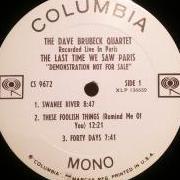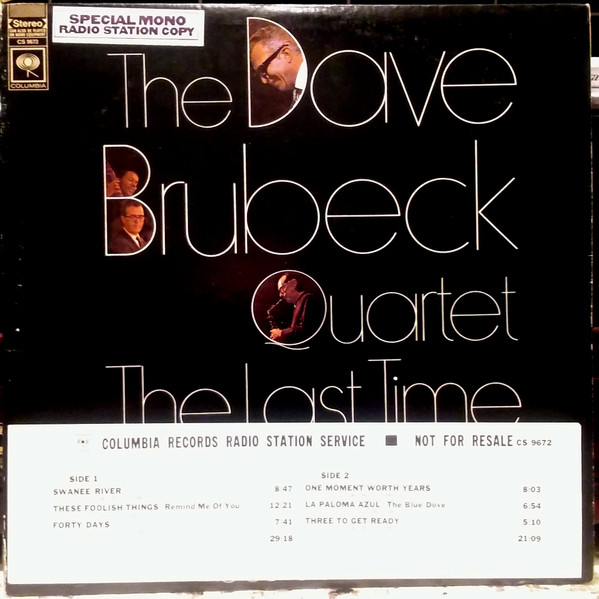-
Posts
11 -
Joined
-
Last visited
-
Donations
0.00 USD
Content Type
Profiles
Forums
Events
Blogs
Posts posted by may1620
-
-
So,
The (valid) criticism has been that the music does not fit the movie, not that the music isn't good. It was a last minute rush job and Dave never saw the film he was working on, I believe.
And I'd suggest don't judge a soundtrack if you haven't heard it.
It was sort of my point that the music, separated from the actual movie, is worth hearing. And I stand by that.
-
A project for the Brubeck family and archive - the Ordeal By Innocence soundtrack. OK, granted it's contrived, incongruent, inexplicably mono, overlayed with sound effects and dialog and unreleased in any separate soundtrack form. But also kind of interesting and worthy of a proper release.
-
I am currently working on producing a nice digital copy of the Dave Brubeck Quartet's 1968 release "The Last Time We Saw Paris", in mono. This was at the time the last recording released of the classic quartet, with Eugene Wright, Joe Morello, and of course Paul Desmond. All of the commercial releases that I have seen are "fake" stereo, that is rechanneled from the original mono source. Only the white label promo release is mono. The album has never been released on CD, though one of the 6 tracks was included on a compilation CD set. The release came so late in the transition from mono to stereo at Columbia that there was no mono (CL) release sold, and the promo still has the stereo (CS) number and sleeve.
https://www.discogs.com/release/8253677-The-Dave-Brubeck-Quartet-The-Last-Time-We-Saw-Paris
-
Thanks, stereo cartridge does make sense of course!
-
Hi,
Just checking back in, as I'm now had a chance to use this Audacity procedure on a more few recordings, and it's really quite remarkable. I have thus far just left the "Isolate Center" setting on default, 1, 120, 9000.
Do I understand correctly that what the software is doing, when applied to a mono record recorded in 2 tracks, is that it analyzes both tracks and preserves only what is present simultaneously on both tracks? That is, finding what is different between L and R and then leaving it out? Some of the larger surface pops seem to be still present, but much smaller/softer. What are we losing from the recording when we do this? Do I have to use a stereo cartridge or should I use my mono cartridge but just have Audacity record in stereo? Trying to refine my technique a bit before going back to re-record some of my favorite mono recordings. Thanks.
-
2 hours ago, medjuck said:
Yes, please.
I just sent you a PM with link. I am new to forum so not sure what resources may be here for this. And I don't upload to Youtube or anything like that.
-
This is about the 1957 Desmond - Mulligan Quartet that recorded tracks Aug 2nd and 27th, released on the self-titled Verve LP (later also known as Blues In Time). Joe Benjamin plays bass, and Dave Bailey, drums. That record and all subsequent versions on vinyl and CD has a track called Standstill (or sometimes Stand Still) that is 3:24 in duration and composed by Gerry Mulligan. I have not found reference to another Standstill in any of the various discographies or other sources.
What I have found on the 1962 Verve Compilation 3-LP set Greatest Names In Jazz, credited to the quartet, is a different Standstill that is 8:16 in duration, composed by Paul Desmond. It does not seem to be Standstill at all, but in fact an alternate take of the song Battle Hymn of the Republican. The song by that title (7:42, Desmond) was also released on the 1957 LP, though you can tell with the first few notes that this compilation track is quite different. It has the same general structure as Battle Hymn, trading sax solos, harmonies, bass solo, etc. The compilation was released both in mono and reprocessed stereo, and includes tracks from a wide range of Verve artists. I don't know if any of the other recordings are obscure or uncommon.
I'm guessing this take has to be from the same sessions, and surely back in 1962 fans would have recognized this as a new, non-LP track. But since that is a little before I was buying records (or even born), I just have our modern sources to go by. I stumbled upon this track only recently, having been previously satisfied that I had identified all available authorized Paul Desmond (without Brubeck) recordings some time ago. In retrospect, the track duration and composer credit do offer clues that it is something different.
And I'm happy to make an audio file available, if anyone wants a listen?
https://www.discogs.com/release/9406618-Various-The-Greatest-Names-In-Jazz
-
I don't know exactly what it is, or who hosts it for what purpose, but I have found some interesting music at the Internet Archive.
It's been very useful for some 10" 78 rpm jazz sides, or 1950s 10" LPs, or maybe 60s-70s LPs that never made it to CD. Sometimes there are records that I think I might want, but for $$$, and I want to have a listen first. And it's way too old or obscure for some lossy streaming service to ever be interested in offering it.
I am new to the forum, having browsed a bit. Please forgive me if this topic has been discussed to death or is off limits for some reason.
For example, Paul Desmond on clarinet, parts 1 and 2:
-
Interesting. After joining the forum recently and finding this thread, I just started using this Audacity feature on some noisy 2-track files of mono recordings that I have. So far I am impressed. It's much harder for me to find residual "clicks" to repair, but they are much less audible too.
I have wondered about using a strategy like this before, but usually in the context of a stereo recording. If I own 2 copies of a stereo record (usually because the first one was rather noisy), I'd like to be able to digitally remove anything in the files that isn't on both recordings. In this case, though, you'd be wanting the 2 left channels and 2 right channels to "isolate" separately. Then there is the problem of getting two recordings to sync up exactly with speed, amplitude and start. And then maybe you'd have to recombine your finished left and right tracks, again synced exactly! I don't know if Audacity could do that.
_forumlogo.png.a607ef20a6e0c299ab2aa6443aa1f32e.png)



Dave Brubeck Trio Vienna 1967
in New Releases
Posted · Edited by may1620
Hi Stonewall,
I wanted to get back to your original question, re another track from the Vienna concert. Is there a common source, unauthorized or not, for that 7th track? I confess I have not encountered it.
As for the 6 tracks that were released, I have criticisms of both the ORF (lossy files) and Brubeck Editions (limited dynamic range) releases, though I am always happy that we get something.
I have been working lately on producing a nice electronic copy of the (mono promo) Last Time In Paris LP. That one was recording just one night after Vienna and apparent also is associated with bad feelings about Paul's "illness" that caused him to miss Vienna. It may even be the reason that we don't have Paris on CD, to this day.